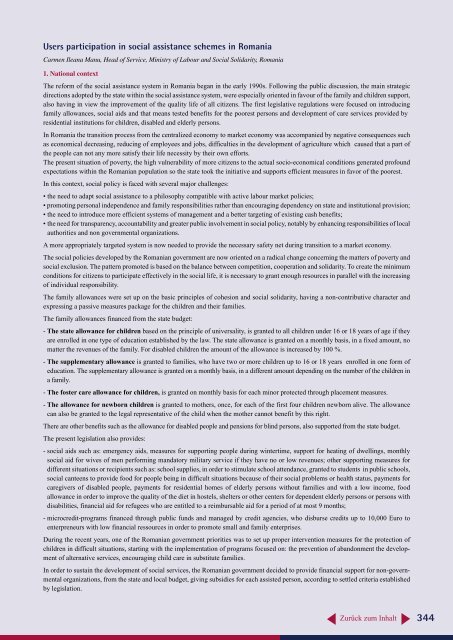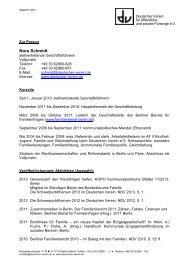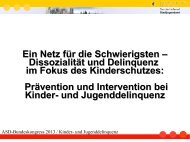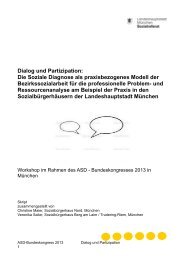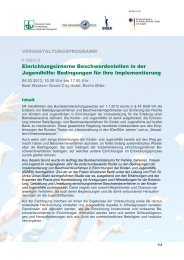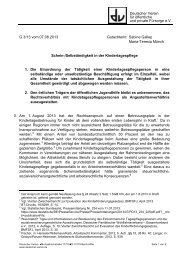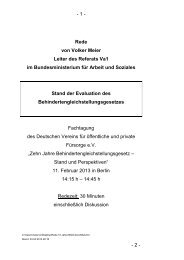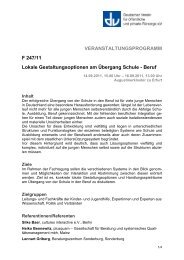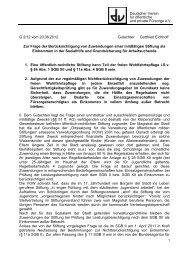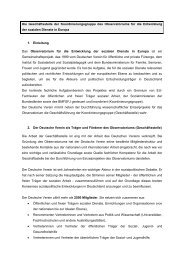Workshop 1.6 - Deutscher Verein für öffentliche und private Fürsorge
Workshop 1.6 - Deutscher Verein für öffentliche und private Fürsorge
Workshop 1.6 - Deutscher Verein für öffentliche und private Fürsorge
Erfolgreiche ePaper selbst erstellen
Machen Sie aus Ihren PDF Publikationen ein blätterbares Flipbook mit unserer einzigartigen Google optimierten e-Paper Software.
Users participation in social assistance schemes in Romania<br />
Carmen Ileana Manu, Head of Service, Ministry of Labour and Social Solidarity, Romania<br />
1. National context<br />
The reform of the social assistance system in Romania began in the early 1990s. Following the public discussion, the main strategic<br />
directions adopted by the state within the social assistance system, were especially oriented in favour of the family and children support,<br />
also having in view the improvement of the quality life of all citizens. The first legislative regulations were focused on introducing<br />
family allowances, social aids and that means tested benefits for the poorest persons and development of care services provided by<br />
residential institutions for children, disabled and elderly persons.<br />
In Romania the transition process from the centralized economy to market economy was accompanied by negative consequences such<br />
as economical decreasing, reducing of employees and jobs, difficulties in the development of agriculture which caused that a part of<br />
the people can not any more satisfy their life necessity by their own efforts.<br />
The present situation of poverty, the high vulnerability of more citizens to the actual socio-economical conditions generated profo<strong>und</strong><br />
expectations within the Romanian population so the state took the initiative and supports efficient measures in favor of the poorest.<br />
In this context, social policy is faced with several major challenges:<br />
• the need to adapt social assistance to a philosophy compatible with active labour market policies;<br />
• promoting personal independence and family responsibilities rather than encouraging dependency on state and institutional provision;<br />
• the need to introduce more efficient systems of management and a better targeting of existing cash benefits;<br />
• the need for transparency, accountability and greater public involvement in social policy, notably by enhancing responsibilities of local<br />
authorities and non governmental organizations.<br />
A more appropriately targeted system is now needed to provide the necessary safety net during transition to a market economy.<br />
The social policies developed by the Romanian government are now oriented on a radical change concerning the matters of poverty and<br />
social exclusion. The pattern promoted is based on the balance between competition, cooperation and solidarity. To create the minimum<br />
conditions for citizens to participate effectively in the social life, it is necessary to grant enough resources in parallel with the increasing<br />
of individual responsibility.<br />
The family allowances were set up on the basic principles of cohesion and social solidarity, having a non-contributive character and<br />
expressing a passive measures package for the children and their families.<br />
The family allowances financed from the state budget:<br />
- The state allowance for children based on the principle of universality, is granted to all children <strong>und</strong>er 16 or 18 years of age if they<br />
are enrolled in one type of education established by the law. The state allowance is granted on a monthly basis, in a fixed amount, no<br />
matter the revenues of the family. For disabled children the amount of the allowance is increased by 100 %.<br />
- The supplementary allowance is granted to families, who have two or more children up to 16 or 18 years enrolled in one form of<br />
education. The supplementary allowance is granted on a monthly basis, in a different amount depending on the number of the children in<br />
a family.<br />
- The foster care allowance for children, is granted on monthly basis for each minor protected through placement measures.<br />
- The allowance for newborn children is granted to mothers, once, for each of the first four children newborn alive. The allowance<br />
can also be granted to the legal representative of the child when the mother cannot benefit by this right.<br />
There are other benefits such as the allowance for disabled people and pensions for blind persons, also supported from the state budget.<br />
The present legislation also provides:<br />
- social aids such as: emergency aids, measures for supporting people during wintertime, support for heating of dwellings, monthly<br />
social aid for wives of men performing mandatory military service if they have no or low revenues; other supporting measures for<br />
different situations or recipients such as: school supplies, in order to stimulate school attendance, granted to students in public schools,<br />
social canteens to provide food for people being in difficult situations because of their social problems or health status, payments for<br />
caregivers of disabled people, payments for residential homes of elderly persons without families and with a low income, food<br />
allowance in order to improve the quality of the diet in hostels, shelters or other centers for dependent elderly persons or persons with<br />
disabilities, financial aid for refugees who are entitled to a reimbursable aid for a period of at most 9 months;<br />
- microcredit-programs financed through public f<strong>und</strong>s and managed by credit agencies, who disburse credits up to 10,000 Euro to<br />
enterpreneurs with low financial ressources in order to promote small and family enterprises.<br />
During the recent years, one of the Romanian government priorities was to set up proper intervention measures for the protection of<br />
children in difficult situations, starting with the implementation of programs focused on: the prevention of abandonment the development<br />
of alternative services, encouraging child care in substitute families.<br />
In order to sustain the development of social services, the Romanian government decided to provide financial support for non-governmental<br />
organizations, from the state and local budget, giving subsidies for each assisted person, according to settled criteria established<br />
by legislation.<br />
Zurück zum Inhalt<br />
344


